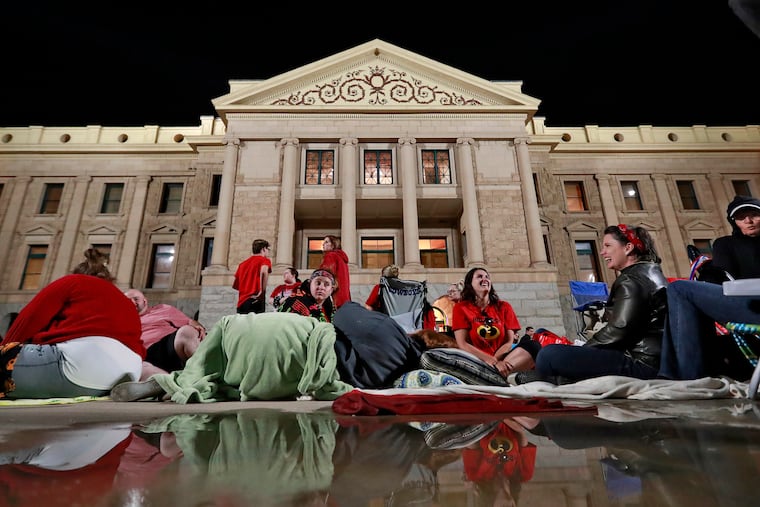How a new tax like Arizona’s could help underfunded schools in Pa. | Opinion
Lessons from the Western states that have succeeded — and a couple that failed — to hike taxes for public education.

Pennsylvania’s school system includes “some of the nation’s most fiscally disadvantaged public school districts,” per one report. One driving reason is inadequate public school funding. Currently, the state covers about 38% of public education costs, which places Pennsylvania 46th in the country for percentage of state public school tax contributions. This low contribution creates inequitable outcomes. Pennsylvania districts largely rely on local property taxes for funding, and the inequity in such taxes between school districts leads to inequities in the final budgets.
Increased public school funding is associated with increased student achievement and economic mobility. Improvements in public education funding should be central to our state’s plan to recover from the pandemic.
» READ MORE: Pennsylvania schools need an additional $4.6 billion to close education gaps, new analysis finds
Pennsylvania can learn from four states — Arizona, Oregon, California, and Illinois — that recently made legislative attempts to either increase their state education funding or impose more progressive tax structures.
As a New York Times editorial argued, most Americans agree that people with more wealth should contribute more to the public good. Election results revealed that taxing the wealthy specifically to fund education is gaining support. The best example of this is in Arizona, where on Nov. 3, residents passed a progressive income tax measure with about 52% of the vote. Proposition 208, also known as the Invest in Education Act, will raise state income tax from 4.5% to 8% for individuals earning above $250,000, or $500,000 for those filing jointly.
Born out of the #RedforEd movement that gained national attention in 2018, the measure comes from years of teachers’ union demands for living wages and improved school resources. Arizona currently ranks last in per-pupil funding, according to the Education Law Center, and its average teacher salary falls far below the national average, ranking 45th nationwide. The tax increase is estimated to raise $827 million for Arizona’s education system, specifically to increase teacher and support staff salaries, teacher recruitment and retention, and career and technical education programs.
The success of Arizona’s Invest in Education Act was not a certainty in this historically conservative state. In fact, Arizona passed this measure while also electing Joe Biden more narrowly than Pennsylvania did. This signifies a level of bipartisan support. As national energy around a wealth tax grows, Pennsylvania should make a similar argument and revise its flat income tax rate in support of its education system.
In addition to Arizona, Multnomah County in Oregon, which includes Portland, passed a similar measure to “tax the rich” in order to provide universal preschool and raise teacher pay with significant voter support.
Oregon and Arizona show that connecting a marginal income tax increase to public school funding is necessary to pass these measures. Pennsylvania should follow in their footsteps and avoid the pitfalls of two other states that could not pass a wealth tax.
Unlike most states, which depend on property taxes, California funds K-12 public schools largely through sales and income taxes, both expected to take a huge hit from the pandemic. In hopes of bolstering the education budget, proponents of California’s Proposition 13 tried to amend the decades-old property tax cap to authorize $15 billion in general obligation bonds for school and college facilities. That effort failed narrowly in March.
Californians tried again in November with Proposition 15, known to supporters as Schools and Communities First. But this time the revenue would come from taxing commercial and industrial properties such as Disneyland at market value rather than their purchase price. Although it seems many Californians support increasing public school funding, the close defeats of Prop 13 and 15 show they are not willing to do it through property tax changes.
» READ MORE: Philadelphia school board reverses itself and approves Hilco tax break
Pennsylvania, and notably Philadelphia, has a similar disinterest in the property tax approach, as made clear by the ongoing debate over the 10-year tax abatement policy. Despite a Good Jobs First report that estimated the Philadelphia School District lost about $62 million due to property tax breaks in 2017, the city has not eliminated the exemption like some newly elected City Council members have advocated for. Instead, the city will impose a 1% Construction Impact Tax, promised to aid affordable housing initiatives, rather than going directly to schools.
To support public schools through income tax, Pennsylvania should learn from Illinois, which narrowly failed to change the state’s income tax from a flat rate to a graduated one. Critics claim that the measure lacked clear vision for where the money would be applied. Had advocates tied the increased revenue to support for the state’s public education, they could have rallied the votes for the initiative.
Bipartisan support for the Arizona and the Oregon measures signals that more Americans want the wealthy to increase their support of public education. But narrow defeats in Illinois and California show the importance of clear messaging on the benefits.
An investment in our schools is an investment in our economy. Pennsylvania should act now to secure a better future for its residents.
Kimberly Sterin is a second-year doctoral student in Drexel University’s School of Education and a former public school teacher. @Ms_Sterin
The Philadelphia Inquirer is one of more than 20 news organizations producing Broke in Philly, a collaborative reporting project on solutions to poverty and the city’s push toward economic justice. See all of our reporting at brokeinphilly.org.